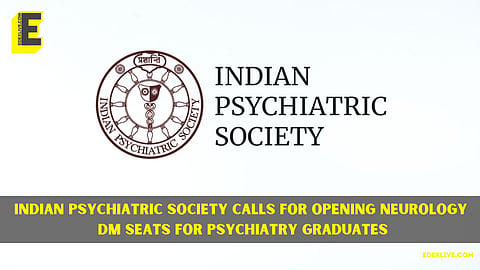Push for Neuropsychiatric integration in medicine: Indian Psychiatric Society calls for opening Neurology DM seats for psychiatry graduates
In a decisive move challenging decades of rigid academic divisions, the Indian Psychiatric Society (IPS), the country’s leading professional body for psychiatrists, has formally petitioned the National Medical Commission (NMC) to include Doctor of Medicine (MD) in Psychiatry among the eligible qualifications for Doctor of Medicine (DM) in Neurology programmes.
Currently, these superspecialty seats are accessible only to those with an MD in General Medicine or Pediatrics.
This reformist appeal, supported by prominent figures in Indian psychiatry, seeks to dismantle a long-standing division between psychiatry and neurology, one that experts argue no longer aligns with the evolving realities of science and clinical practice.
To understand the nuances behind this proposed shift, EdexLive spoke with three key voices in the medical community, exploring the arguments, concerns, and potential implications.
Dr TS Sathyanarayana Rao, Vice-President and President-elect of the Indian Psychiatric Society (IPS), gives a strong critique of the current separation between the two fields.
"The dichotomy of neurology and psychiatry is a farce," he states plainly. "They are two sides of one coin. You don't truly understand psychiatry unless you have a solid foundation in neurology. A thorough understanding of neurology is required for practising psychiatry effectively; without it, accurate diagnosis or prognosis, grounded in evidence, is simply not possible."
Dr Amrit Pattojoshi, General Secretary of the IPS, echoes this position. “We’re not arguing to replace or undermine neurologists. We’re saying: open the door. Let there be pathways for psychiatry graduates to acquire advanced training in neurology, especially when many disorders sit at the interface.”
He points to schizophrenia as a neurodevelopmental condition that often becomes degenerative by middle age. “We see cortical thinning, ventricular enlargement, metabolic changes, clear structural footprints in the brain,” he says. “If psychiatry isn't centred on the brain, then what is its focus? A comprehensive understanding of the brain demands expertise in neurology as much as in psychiatry.”
Pattojoshi brings extensive clinical experience to support these theoretical arguments. “Nearly 50% of the patients we encountered in psychiatry wards during our Neurology postings in post-graduation exhibited overt or subtle neurological issues. That’s a staggering proportion. These signs may not always be immediately apparent, but they influence the course of illness, affect treatment response, and call for a nuanced approach that integrates both neurological and psychiatric insight,” he says.
The diagnostic predicament frustrates Dr Pattojoshi: "Right now, most diagnoses are symptom-based and clinical. Unlike diabetes or hypertension, we can't show patients concrete biological evidence of their condition, which contributes to denial and a lack of insight. With a stronger neurological foundation, we can use imaging and biomarkers to provide more specific diagnoses."
This limitation reflects not just technical shortcomings, but fundamental epistemological constraints imposed by disciplinary boundaries.
The IPS’s letter to the NMC recommends concrete steps. But even as psychiatry professionals push for reform, how does the neurology community respond?
Professor and Head of Neurology at Sri Venkateswara Institute of Medical Sciences, Dr Bhuma Vengamma, articulates neurologists' concerns with clinical precision. She points out that the primary issue lies in the significant difference in the breadth and depth of medical training that an MD in Internal Medicine or Paediatrics provides compared to psychiatry.
"Neurology as a super-specialty is deeply rooted in general medicine. To interpret neurological diseases effectively, one must understand systemic pathophysiology such as cardiovascular, renal, metabolic, and endocrine systems," she explains.
Dr Vengamma acknowledges psychiatric contributions while maintaining clear boundaries, "Psychiatrists certainly contribute meaningfully in the management of several neurological conditions, particularly those with a strong behavioral or cognitive component. In disorders like Parkinson's disease, patients frequently experience depression, anxiety, or psychosis."
While she remains hesitant about blurring the lines between the two fields, she agrees that students with a genuine interest in both specialties should at least be given the opportunity to explore this integration.
Offering a pragmatic perspective, Dr Amrit Pattojoshi emphasises that the push is not about forcing a change but about creating opportunities. “Eligibility doesn’t guarantee admission; candidates will still have to clear the same rigorous entrance examinations. The standards remain equally high for everyone.”
This outlook reframes the debate as one focused on expanding possibilities rather than a zero-sum competition.
This ongoing debate exposes medicine’s struggle to fully grasp the brain’s complexity. As Dr Rao points out, crucial neuroanatomical structures that are regions key to attention, emotion regulation, decision-making, and self-awareness, remain unfamiliar to many psychiatrists despite being foundational to human cognition.
This knowledge gap underscores the potential for educational paradigms to evolve, fostering deeper integration and understanding.
The letter also highlights how countries like the United Kingdom, Germany, and the United States (US) have either integrated psychiatry and neurology training or designed programmes that allow fluid transitions between these specialties.
In this light, the convergence of neurology and psychiatry is not simply professional accommodation, but a recognition that the brain’s unified nature demands unified scientific approaches.
By embracing this challenge, Indian medicine has the opportunity to develop educational models that reflect the true complexity of human neurobiology. This integration promises not just better science and education, but a more compassionate, comprehensive approach to the human brain.



